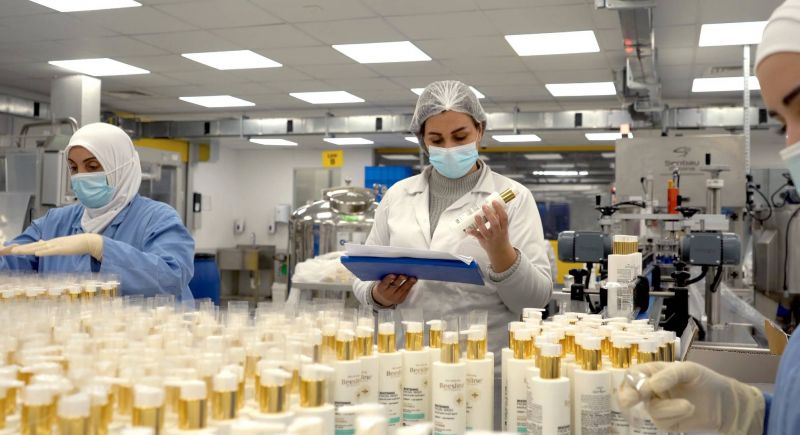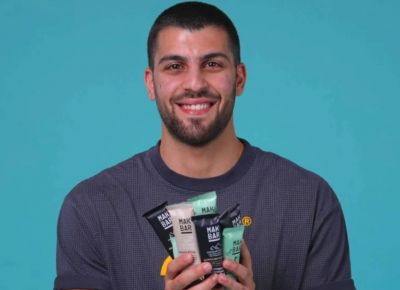
Some 170 employees make up the company's team. (Photo courtesy of Beesline team)
“Come in, to the Beehive”: all who arrive at the Beesline factory in Bshamoun, Mount Lebanon, are welcomed by this phrase.
Inside the industrial hive, posters of bees dressed as lab technicians adorn the walls.
Employees dressed in white lab coats, masks and hair and shoes covers, work busily to produce products old and new.
One floor up is the company’s headquarters. The walls, painted white and yellow, are decorated with bees. Recycling bins can be found in every corner and the phrase “Save the planet,” which reflects Beesline’s commitment to the environment, is also clearly displayed.
Founded in 1993 by siblings Maha Arayssi Rifai and Mohammad Arayssi, the company developed a brand that is well known to Lebanese cosmetics enthusiasts. Divided between the factory and the offices, the workforce includes some 170 employees, most of them Lebanese, said Hassan Rifai, the company’s marketing director.
Maha, a pharmacist, and Mohammad, a chemist, spent two years perfecting the brand’s very first product: a lip balm. After three decades, the company has a product range of 140 items.
“Natural products, with no chemical or harmful additives. And effective,” said Hassan, citing among other things, the success of their deodorant which is free from harmful aluminum chlorohydrate.
The siblings decided to base their products on substances produced by bees, and whose health benefits have been proven. This includes honey, royal jelly, wax and propolis.
The idea of creating a product range that is “good for the skin and the environment,” using the “ultimate pharmacist in the animal kingdom” came to them after their mother had an allergic reaction to a top-of-the-range product, recounted Mohammad.
Towards a greener chain
Beesline products can be found in pharmacies, online, and in some Lebanese supermarkets.
“It’s our priority and our duty as a company to be environmentally friendly,” said Nour Rifai, creative editor and Hassan's sister.
“60 percent of the company’s energy stems from renewable sources, particularly solar energy, and 20 percent of its used water is recycled,” said Nour.
“95 to 98 percent of the raw materials used in our cosmetic products are imported,” said Hassan. “Everything is assembled, tested and packaged in Lebanon, as well as by subcontractors in the United Arab Emirates and Egypt.”
As for the bee products, most of them come from Africa, said Hassan, where their “biggest supplier is the Dutch company, Koster Keunen.”
“We are planning to change this supply chain to ensure a greener chain with products made on the continent where they are sold,” he continued.
To ensure that the products are natural and environmentally friendly, “we have research and technology teams, laboratory technicians, mixology supervisors, quality control, production and packaging,” said Farah Missi, director of manufacturing operations.
“Each machine is dedicated to a product and each room to a part of the supply chain,” said Ola Chaddad, production supervisor.
The corridor leading to the packaging rooms is mapped out by blue barrels labeled by batch and product. Once they pass quality control, they are assembled in the rooms further down the corridor.
Towards European market
Well established in the region, with its largest market being in Saudi Arabia since 1996, Beesline incurred losses in Lebanon during the first two years of the crisis.
“At the beginning of the crisis, we decided to support our Lebanese customers, who represent only four percent of our consumers, and not to raise our prices,” said Hassan. He recalled the context in which prices fluctuated wildly due to the devaluation of the Lebanese lira.
To remain affordable to the Lebanese, Beesline diversified its products. It developed a number of quality hair care products sold at reasonable prices. Speaking from his desk, Hassan told L’Orient-Le Jour that this has helped increase the number of local consumers.
“Being based in Lebanon is a blessing and a curse as well,” he said. “It has taught us to adapt to the worst situations, both at the personal level and as a company.”
To ensure its survival throughout Lebanon’s instability, Beesline developed several mechanisms. They set a plan within each department, which is reviewed every year for a period of five years.
Describing Saudi restrictions on Lebanese imports since 2021 as the biggest hurdle Beesline has faced since 2019, Hassan spoke of a plan Beesline prepared in advance in the event of a ban on Lebanese imports.
“Thanks to this contingency plan, we were able to adapt to these restrictions, which did not impact our largest market, by resorting to manufacturing in the United Arab Emirates.”
The UAE is Beesline’s second biggest market, followed by Egypt. This ranking could change in a few years, given that the brand entered the Asian market via China two years ago, and is due to enter European markets in September, starting with France and followed by Italy, Germany, Norway and Sweden.
This article was originally published in French in L'Orient-Le Jour. Translation by Joelle El Khoury.

